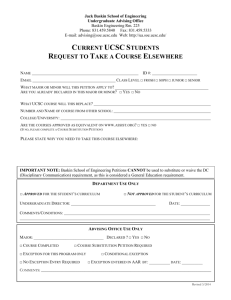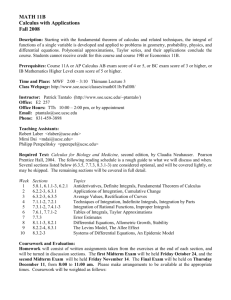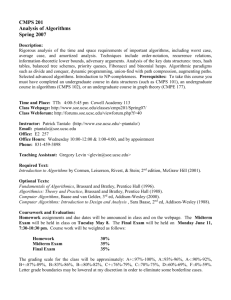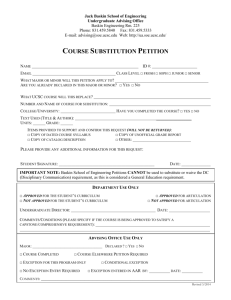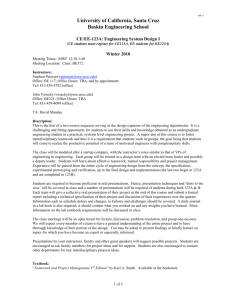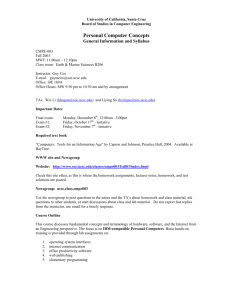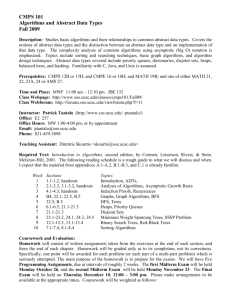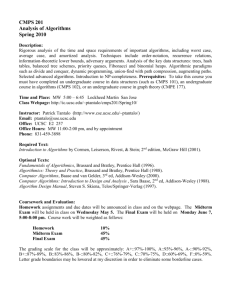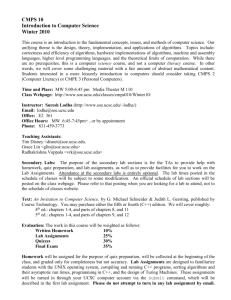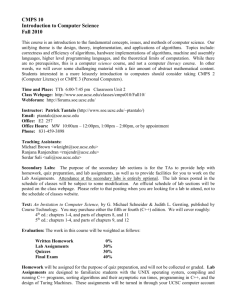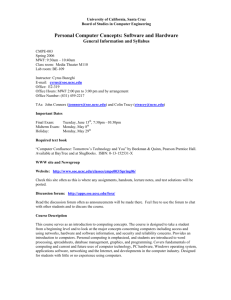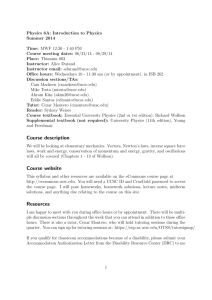word - Courses
advertisement
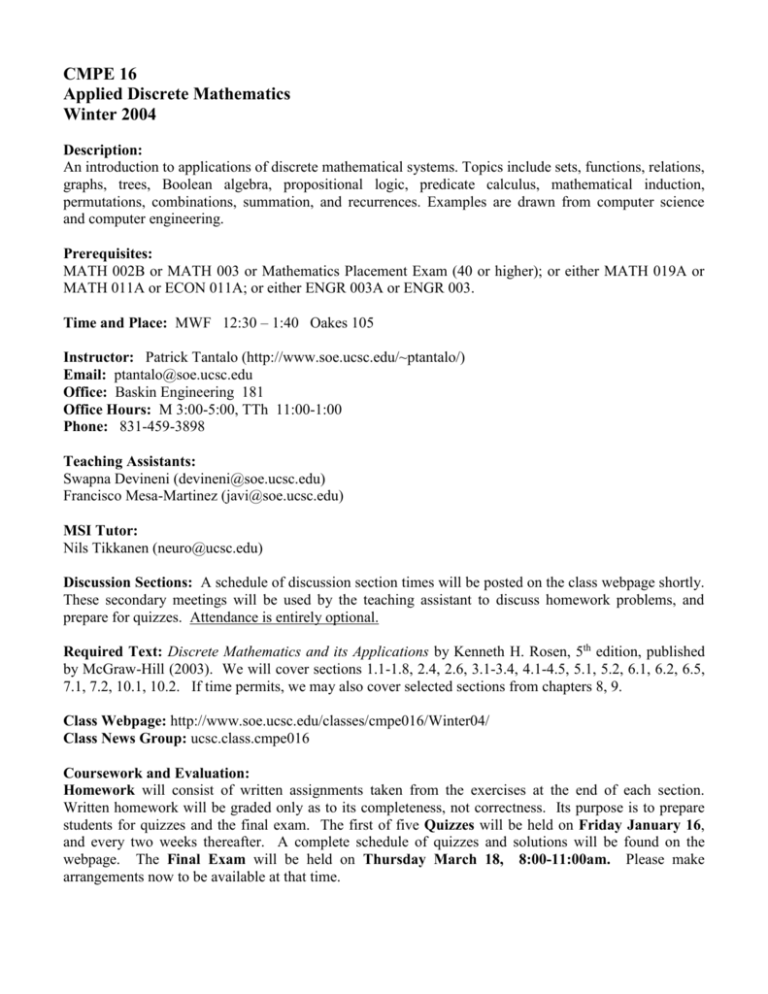
CMPE 16 Applied Discrete Mathematics Winter 2004 Description: An introduction to applications of discrete mathematical systems. Topics include sets, functions, relations, graphs, trees, Boolean algebra, propositional logic, predicate calculus, mathematical induction, permutations, combinations, summation, and recurrences. Examples are drawn from computer science and computer engineering. Prerequisites: MATH 002B or MATH 003 or Mathematics Placement Exam (40 or higher); or either MATH 019A or MATH 011A or ECON 011A; or either ENGR 003A or ENGR 003. Time and Place: MWF 12:30 – 1:40 Oakes 105 Instructor: Patrick Tantalo (http://www.soe.ucsc.edu/~ptantalo/) Email: ptantalo@soe.ucsc.edu Office: Baskin Engineering 181 Office Hours: M 3:00-5:00, TTh 11:00-1:00 Phone: 831-459-3898 Teaching Assistants: Swapna Devineni (devineni@soe.ucsc.edu) Francisco Mesa-Martinez (javi@soe.ucsc.edu) MSI Tutor: Nils Tikkanen (neuro@ucsc.edu) Discussion Sections: A schedule of discussion section times will be posted on the class webpage shortly. These secondary meetings will be used by the teaching assistant to discuss homework problems, and prepare for quizzes. Attendance is entirely optional. Required Text: Discrete Mathematics and its Applications by Kenneth H. Rosen, 5th edition, published by McGraw-Hill (2003). We will cover sections 1.1-1.8, 2.4, 2.6, 3.1-3.4, 4.1-4.5, 5.1, 5.2, 6.1, 6.2, 6.5, 7.1, 7.2, 10.1, 10.2. If time permits, we may also cover selected sections from chapters 8, 9. Class Webpage: http://www.soe.ucsc.edu/classes/cmpe016/Winter04/ Class News Group: ucsc.class.cmpe016 Coursework and Evaluation: Homework will consist of written assignments taken from the exercises at the end of each section. Written homework will be graded only as to its completeness, not correctness. Its purpose is to prepare students for quizzes and the final exam. The first of five Quizzes will be held on Friday January 16, and every two weeks thereafter. A complete schedule of quizzes and solutions will be found on the webpage. The Final Exam will be held on Thursday March 18, 8:00-11:00am. Please make arrangements now to be available at that time. Coursework will be weighted as follows: Homework Quizzes Final Exam 5% 50% 45% The grading scale for the class will be approximately: A+::97%-100%, A::93%-96%, A-::90%-92%, B+::87%-89%, B::83%-86%, B-::80%-82%, C+::76%-79%, C::70%-75%, D::60%-69%, F::0%-59%. Letter grade boundaries may be lowered at my discretion in order to eliminate some borderline cases. Academic Honesty: In recent years, there has been an increased number of cheating incidents in many UC campuses, and unfortunately, UCSC is no exception. The Baskin School of Engineering has a zero tolerance policy for any incident of academic dishonesty. If cheating occurs, consequences within the context of the course may range from getting zero on a particular assignment, to failing the course. In addition, every case of academic dishonesty is referred to the students’ college Provost, who sets in motion an official disciplinary process. Cheating in any part of the course may lead to failing the course and suspension or dismissal from the university. What is cheating? In short, it is presenting someone else’s work as your own. Examples would include copying another student's written homework assignment or exam, or allowing your own work to be copied. Although you may discuss homework problems with fellow students, your collaboration must be at the level of ideas only. Legitimate collaboration ends when you "lend", "borrow", or "trade" written solutions to problems, or in any way share in the act of writing your answers. If you do collaborate (legitimately) or receive help from anyone, you must credit them by placing their name(s) at the top of your paper. The following is from the Winter 2004 Schedule of classes under General Information: Academic Integrity All members of the UCSC academic community have an explicit responsibility to present as their original work only that which is truly their own. Cheating, plagiarism, and other forms of academic dishonesty are contrary to the ideals and purposes of a university and will not be tolerated. Note that plagiarism includes the deliberate misrepresentation of someone else's words and ideas as your own, as well as paraphrasing without footnoting the source. Students and faculty are jointly responsible for assuring that the integrity of scholarship is valued and preserved. To view the full text of the new policy on academic integrity on the Web, see: http://www.ucsc.edu/academics/academic_integrity/ Due Process Students charged with academic dishonesty have the right to due process through established policies and regulations concerning student conduct and discipline. Copies of these policies and regulations can be found in the Rule Book (http://www2.ucsc.edu/judicial) which is available at the offices of each college provost, the dean of graduate studies, and the Vice Chancellor of Student Affairs.
